Leadership Development Plan: Analysis and Personal Development Plan
VerifiedAdded on 2022/10/02
|21
|4123
|108
Report
AI Summary
This report details a student's leadership development plan, focusing on self-assessment, analysis of a chosen leader (Steve Jobs), and the creation of a personal growth strategy. The report begins with an introduction to leadership and its importance, followed by an in-depth analysis of Steve Jobs' leadership traits, including innovation, urgency, and taking responsibility. The student then reflects on their own leadership skills, identifying strengths such as self-confidence and empathy, alongside weaknesses like impatience and difficulty with team integration. A development plan is then outlined, including goals for improving communication, handling difficult situations, and fostering cooperation within teams, with specific actions, timeframes, and measurement indicators. The plan incorporates elements of self-love, strong communication, and decisive decision-making, aiming for high leadership qualities and achieving the end goal of becoming a more effective leader.
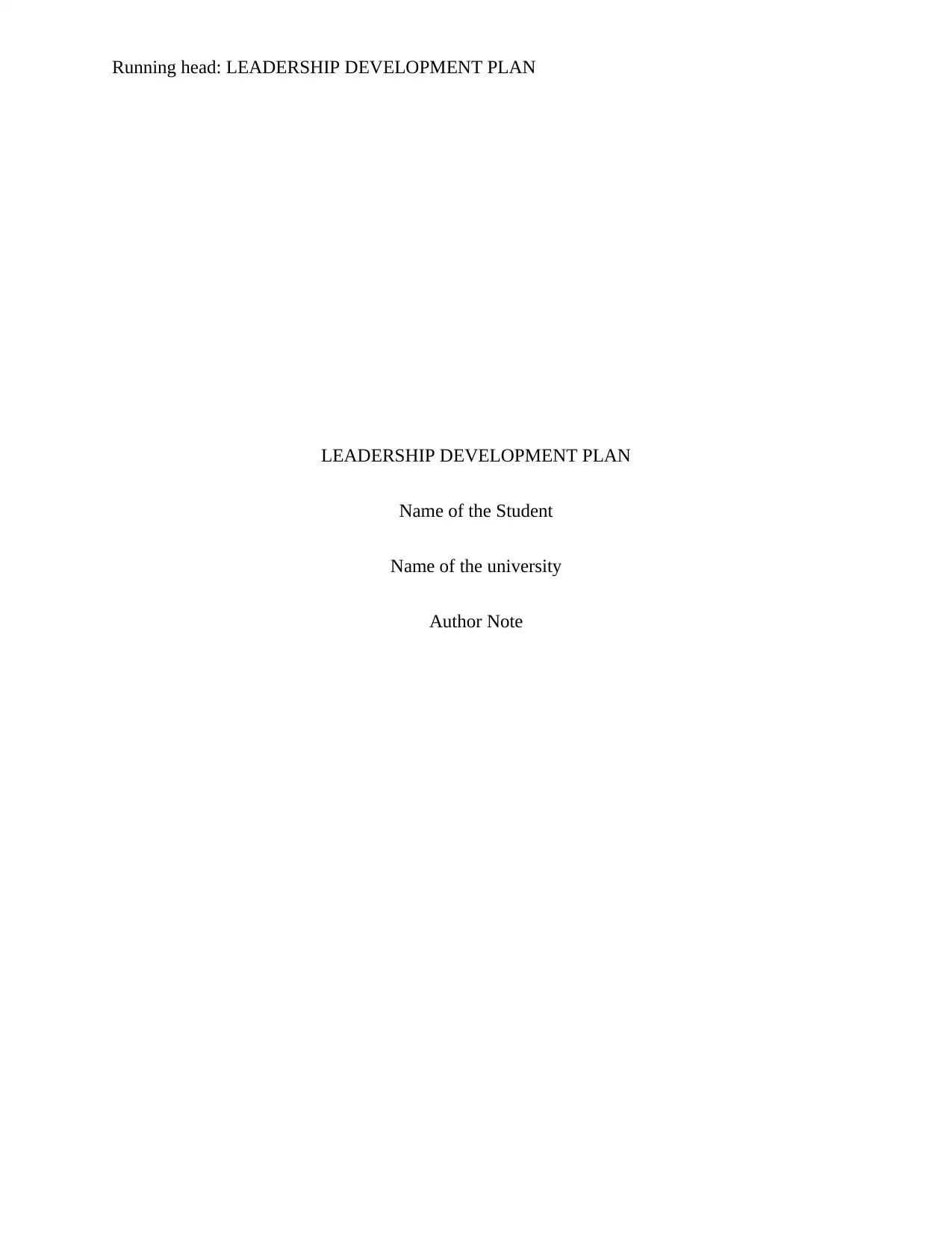
Running head: LEADERSHIP DEVELOPMENT PLAN
LEADERSHIP DEVELOPMENT PLAN
Name of the Student
Name of the university
Author Note
LEADERSHIP DEVELOPMENT PLAN
Name of the Student
Name of the university
Author Note
Paraphrase This Document
Need a fresh take? Get an instant paraphrase of this document with our AI Paraphraser
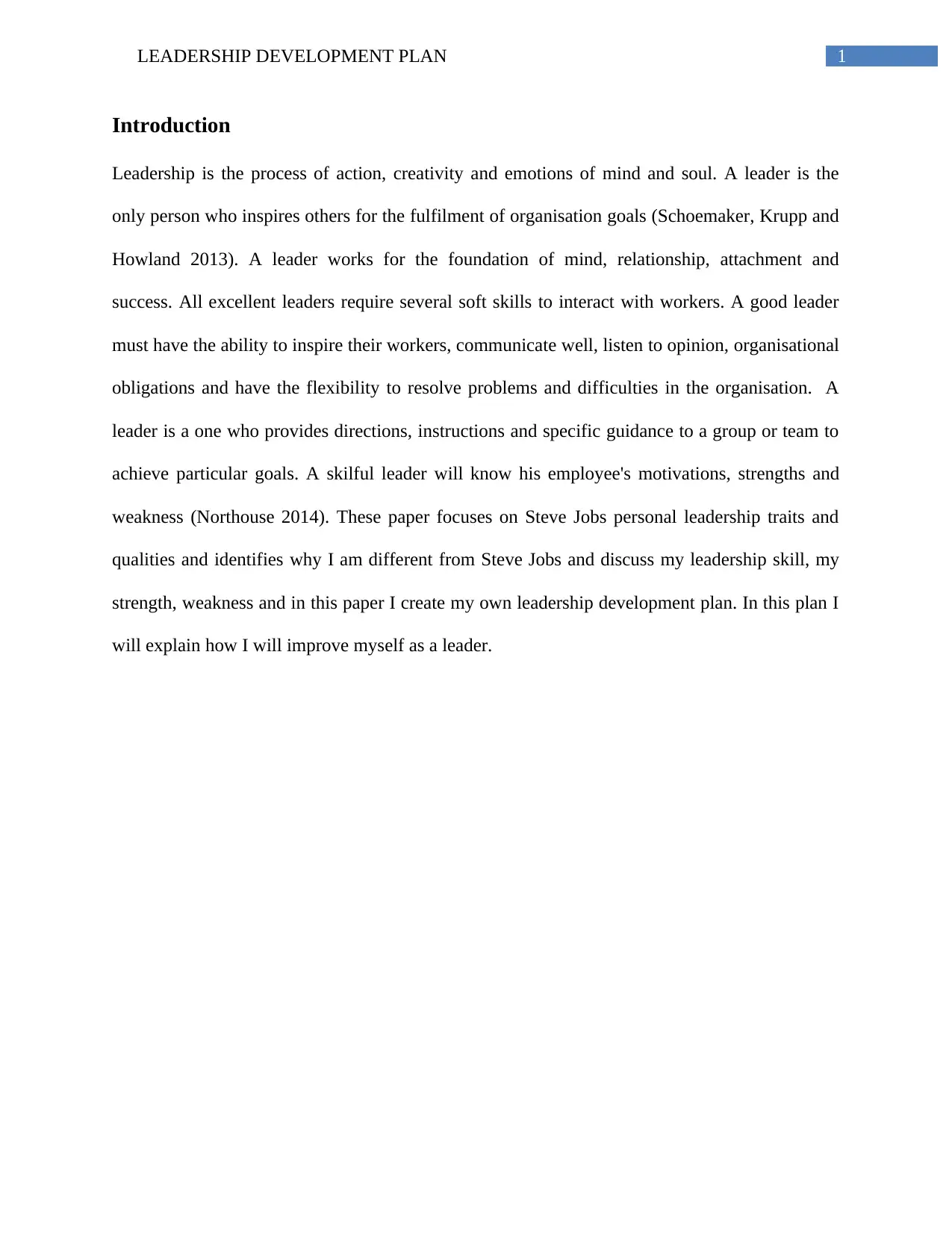
1LEADERSHIP DEVELOPMENT PLAN
Introduction
Leadership is the process of action, creativity and emotions of mind and soul. A leader is the
only person who inspires others for the fulfilment of organisation goals (Schoemaker, Krupp and
Howland 2013). A leader works for the foundation of mind, relationship, attachment and
success. All excellent leaders require several soft skills to interact with workers. A good leader
must have the ability to inspire their workers, communicate well, listen to opinion, organisational
obligations and have the flexibility to resolve problems and difficulties in the organisation. A
leader is a one who provides directions, instructions and specific guidance to a group or team to
achieve particular goals. A skilful leader will know his employee's motivations, strengths and
weakness (Northouse 2014). These paper focuses on Steve Jobs personal leadership traits and
qualities and identifies why I am different from Steve Jobs and discuss my leadership skill, my
strength, weakness and in this paper I create my own leadership development plan. In this plan I
will explain how I will improve myself as a leader.
Introduction
Leadership is the process of action, creativity and emotions of mind and soul. A leader is the
only person who inspires others for the fulfilment of organisation goals (Schoemaker, Krupp and
Howland 2013). A leader works for the foundation of mind, relationship, attachment and
success. All excellent leaders require several soft skills to interact with workers. A good leader
must have the ability to inspire their workers, communicate well, listen to opinion, organisational
obligations and have the flexibility to resolve problems and difficulties in the organisation. A
leader is a one who provides directions, instructions and specific guidance to a group or team to
achieve particular goals. A skilful leader will know his employee's motivations, strengths and
weakness (Northouse 2014). These paper focuses on Steve Jobs personal leadership traits and
qualities and identifies why I am different from Steve Jobs and discuss my leadership skill, my
strength, weakness and in this paper I create my own leadership development plan. In this plan I
will explain how I will improve myself as a leader.
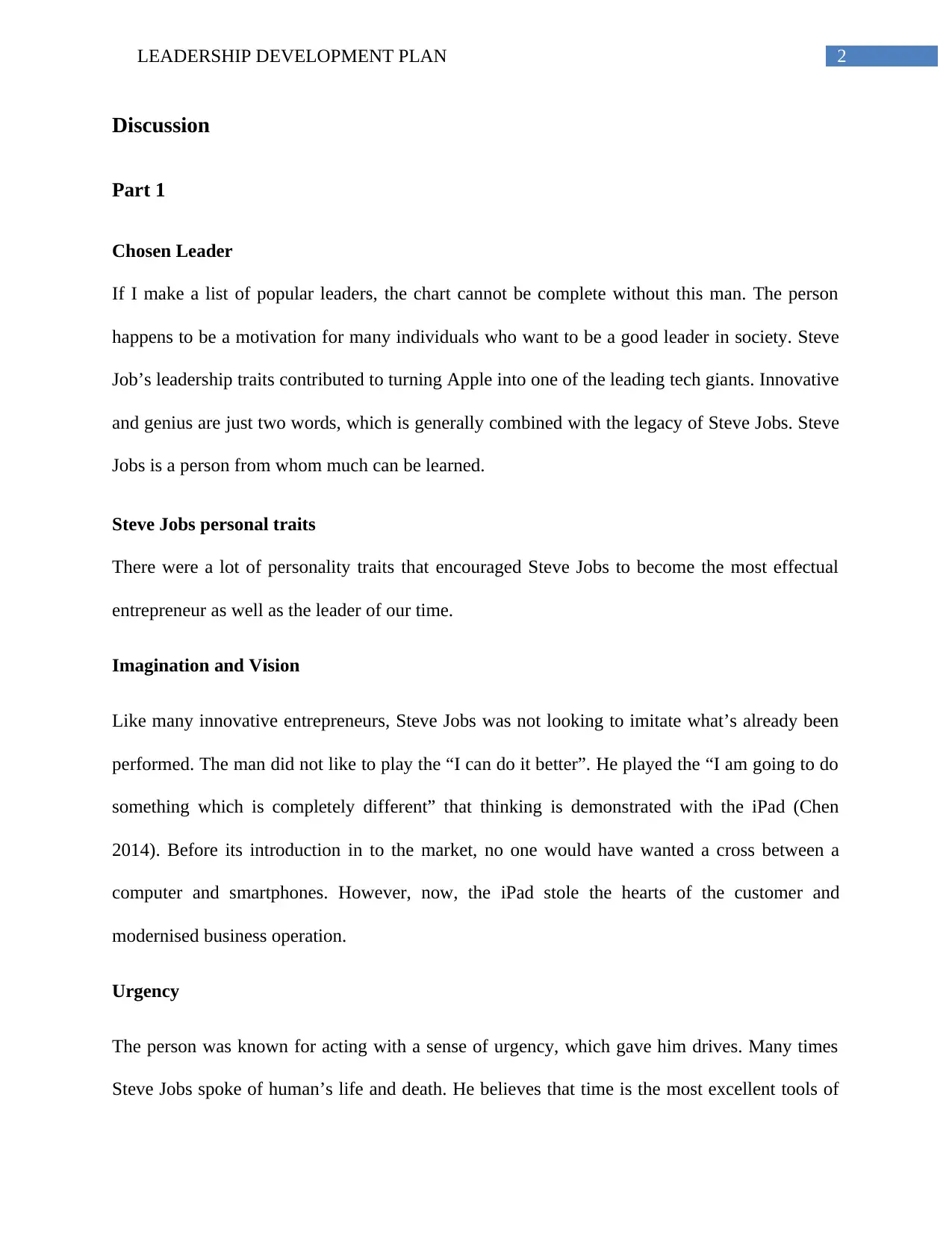
2LEADERSHIP DEVELOPMENT PLAN
Discussion
Part 1
Chosen Leader
If I make a list of popular leaders, the chart cannot be complete without this man. The person
happens to be a motivation for many individuals who want to be a good leader in society. Steve
Job’s leadership traits contributed to turning Apple into one of the leading tech giants. Innovative
and genius are just two words, which is generally combined with the legacy of Steve Jobs. Steve
Jobs is a person from whom much can be learned.
Steve Jobs personal traits
There were a lot of personality traits that encouraged Steve Jobs to become the most effectual
entrepreneur as well as the leader of our time.
Imagination and Vision
Like many innovative entrepreneurs, Steve Jobs was not looking to imitate what’s already been
performed. The man did not like to play the “I can do it better”. He played the “I am going to do
something which is completely different” that thinking is demonstrated with the iPad (Chen
2014). Before its introduction in to the market, no one would have wanted a cross between a
computer and smartphones. However, now, the iPad stole the hearts of the customer and
modernised business operation.
Urgency
The person was known for acting with a sense of urgency, which gave him drives. Many times
Steve Jobs spoke of human’s life and death. He believes that time is the most excellent tools of
Discussion
Part 1
Chosen Leader
If I make a list of popular leaders, the chart cannot be complete without this man. The person
happens to be a motivation for many individuals who want to be a good leader in society. Steve
Job’s leadership traits contributed to turning Apple into one of the leading tech giants. Innovative
and genius are just two words, which is generally combined with the legacy of Steve Jobs. Steve
Jobs is a person from whom much can be learned.
Steve Jobs personal traits
There were a lot of personality traits that encouraged Steve Jobs to become the most effectual
entrepreneur as well as the leader of our time.
Imagination and Vision
Like many innovative entrepreneurs, Steve Jobs was not looking to imitate what’s already been
performed. The man did not like to play the “I can do it better”. He played the “I am going to do
something which is completely different” that thinking is demonstrated with the iPad (Chen
2014). Before its introduction in to the market, no one would have wanted a cross between a
computer and smartphones. However, now, the iPad stole the hearts of the customer and
modernised business operation.
Urgency
The person was known for acting with a sense of urgency, which gave him drives. Many times
Steve Jobs spoke of human’s life and death. He believes that time is the most excellent tools of
⊘ This is a preview!⊘
Do you want full access?
Subscribe today to unlock all pages.

Trusted by 1+ million students worldwide
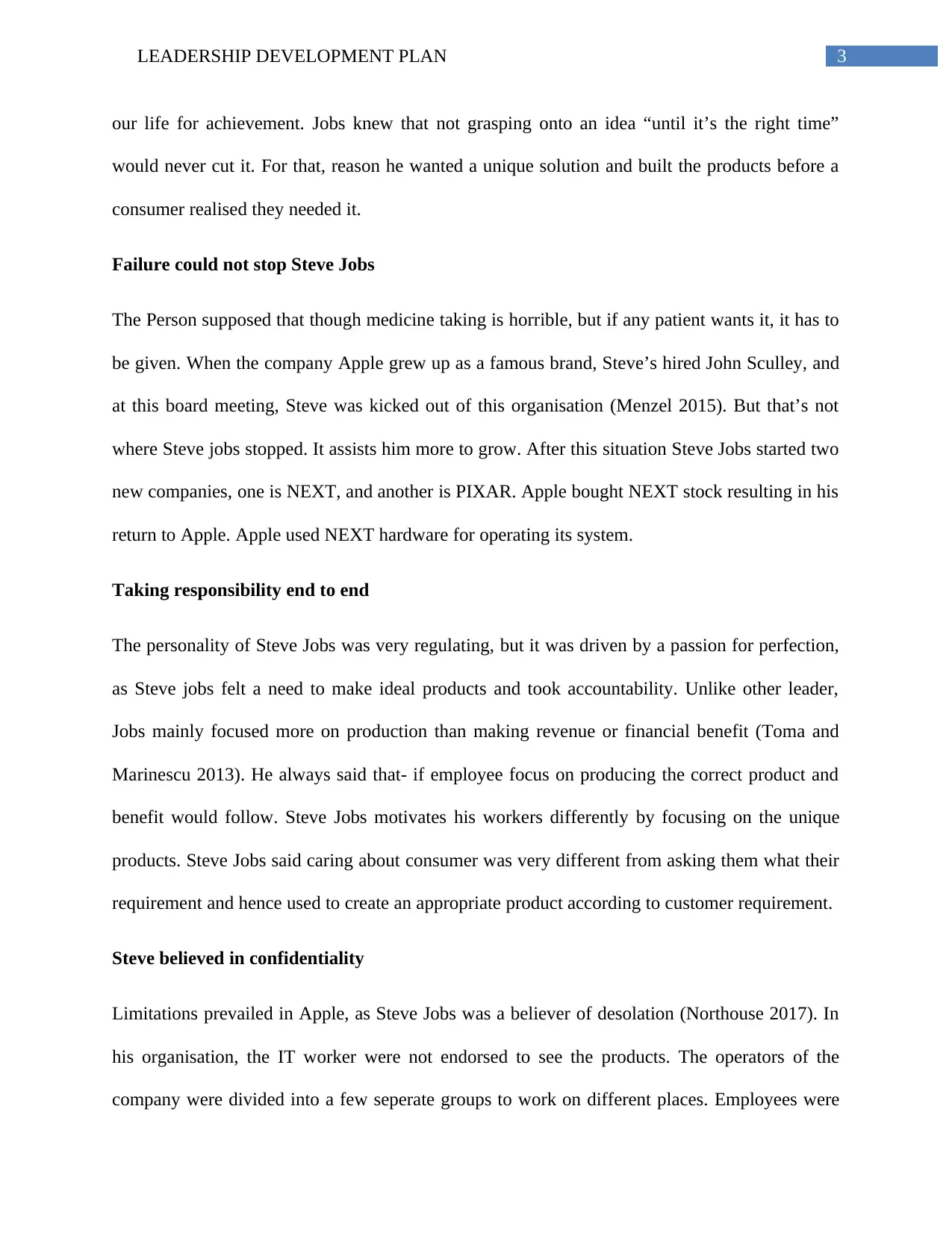
3LEADERSHIP DEVELOPMENT PLAN
our life for achievement. Jobs knew that not grasping onto an idea “until it’s the right time”
would never cut it. For that, reason he wanted a unique solution and built the products before a
consumer realised they needed it.
Failure could not stop Steve Jobs
The Person supposed that though medicine taking is horrible, but if any patient wants it, it has to
be given. When the company Apple grew up as a famous brand, Steve’s hired John Sculley, and
at this board meeting, Steve was kicked out of this organisation (Menzel 2015). But that’s not
where Steve jobs stopped. It assists him more to grow. After this situation Steve Jobs started two
new companies, one is NEXT, and another is PIXAR. Apple bought NEXT stock resulting in his
return to Apple. Apple used NEXT hardware for operating its system.
Taking responsibility end to end
The personality of Steve Jobs was very regulating, but it was driven by a passion for perfection,
as Steve jobs felt a need to make ideal products and took accountability. Unlike other leader,
Jobs mainly focused more on production than making revenue or financial benefit (Toma and
Marinescu 2013). He always said that- if employee focus on producing the correct product and
benefit would follow. Steve Jobs motivates his workers differently by focusing on the unique
products. Steve Jobs said caring about consumer was very different from asking them what their
requirement and hence used to create an appropriate product according to customer requirement.
Steve believed in confidentiality
Limitations prevailed in Apple, as Steve Jobs was a believer of desolation (Northouse 2017). In
his organisation, the IT worker were not endorsed to see the products. The operators of the
company were divided into a few seperate groups to work on different places. Employees were
our life for achievement. Jobs knew that not grasping onto an idea “until it’s the right time”
would never cut it. For that, reason he wanted a unique solution and built the products before a
consumer realised they needed it.
Failure could not stop Steve Jobs
The Person supposed that though medicine taking is horrible, but if any patient wants it, it has to
be given. When the company Apple grew up as a famous brand, Steve’s hired John Sculley, and
at this board meeting, Steve was kicked out of this organisation (Menzel 2015). But that’s not
where Steve jobs stopped. It assists him more to grow. After this situation Steve Jobs started two
new companies, one is NEXT, and another is PIXAR. Apple bought NEXT stock resulting in his
return to Apple. Apple used NEXT hardware for operating its system.
Taking responsibility end to end
The personality of Steve Jobs was very regulating, but it was driven by a passion for perfection,
as Steve jobs felt a need to make ideal products and took accountability. Unlike other leader,
Jobs mainly focused more on production than making revenue or financial benefit (Toma and
Marinescu 2013). He always said that- if employee focus on producing the correct product and
benefit would follow. Steve Jobs motivates his workers differently by focusing on the unique
products. Steve Jobs said caring about consumer was very different from asking them what their
requirement and hence used to create an appropriate product according to customer requirement.
Steve believed in confidentiality
Limitations prevailed in Apple, as Steve Jobs was a believer of desolation (Northouse 2017). In
his organisation, the IT worker were not endorsed to see the products. The operators of the
company were divided into a few seperate groups to work on different places. Employees were
Paraphrase This Document
Need a fresh take? Get an instant paraphrase of this document with our AI Paraphraser
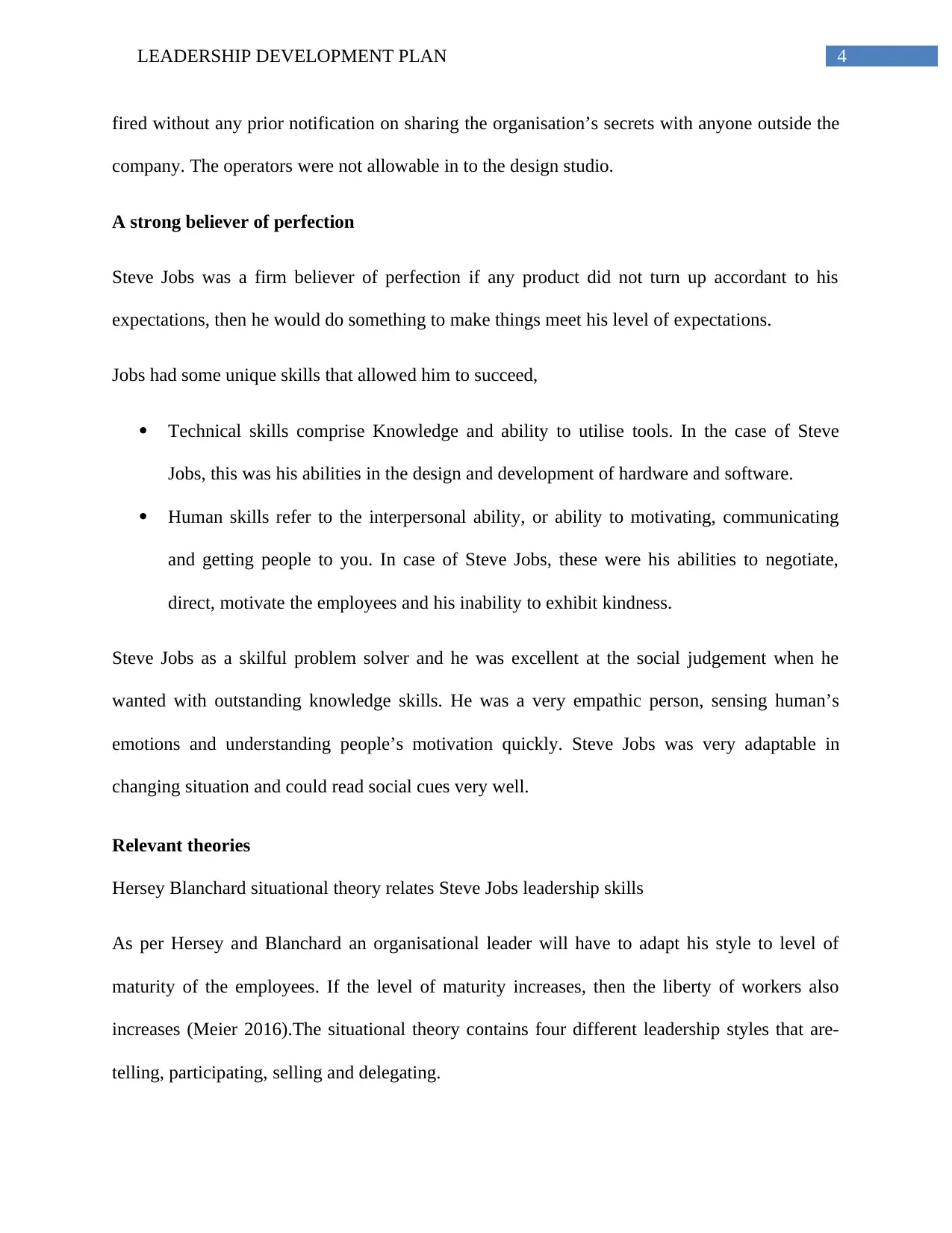
4LEADERSHIP DEVELOPMENT PLAN
fired without any prior notification on sharing the organisation’s secrets with anyone outside the
company. The operators were not allowable in to the design studio.
A strong believer of perfection
Steve Jobs was a firm believer of perfection if any product did not turn up accordant to his
expectations, then he would do something to make things meet his level of expectations.
Jobs had some unique skills that allowed him to succeed,
Technical skills comprise Knowledge and ability to utilise tools. In the case of Steve
Jobs, this was his abilities in the design and development of hardware and software.
Human skills refer to the interpersonal ability, or ability to motivating, communicating
and getting people to you. In case of Steve Jobs, these were his abilities to negotiate,
direct, motivate the employees and his inability to exhibit kindness.
Steve Jobs as a skilful problem solver and he was excellent at the social judgement when he
wanted with outstanding knowledge skills. He was a very empathic person, sensing human’s
emotions and understanding people’s motivation quickly. Steve Jobs was very adaptable in
changing situation and could read social cues very well.
Relevant theories
Hersey Blanchard situational theory relates Steve Jobs leadership skills
As per Hersey and Blanchard an organisational leader will have to adapt his style to level of
maturity of the employees. If the level of maturity increases, then the liberty of workers also
increases (Meier 2016).The situational theory contains four different leadership styles that are-
telling, participating, selling and delegating.
fired without any prior notification on sharing the organisation’s secrets with anyone outside the
company. The operators were not allowable in to the design studio.
A strong believer of perfection
Steve Jobs was a firm believer of perfection if any product did not turn up accordant to his
expectations, then he would do something to make things meet his level of expectations.
Jobs had some unique skills that allowed him to succeed,
Technical skills comprise Knowledge and ability to utilise tools. In the case of Steve
Jobs, this was his abilities in the design and development of hardware and software.
Human skills refer to the interpersonal ability, or ability to motivating, communicating
and getting people to you. In case of Steve Jobs, these were his abilities to negotiate,
direct, motivate the employees and his inability to exhibit kindness.
Steve Jobs as a skilful problem solver and he was excellent at the social judgement when he
wanted with outstanding knowledge skills. He was a very empathic person, sensing human’s
emotions and understanding people’s motivation quickly. Steve Jobs was very adaptable in
changing situation and could read social cues very well.
Relevant theories
Hersey Blanchard situational theory relates Steve Jobs leadership skills
As per Hersey and Blanchard an organisational leader will have to adapt his style to level of
maturity of the employees. If the level of maturity increases, then the liberty of workers also
increases (Meier 2016).The situational theory contains four different leadership styles that are-
telling, participating, selling and delegating.
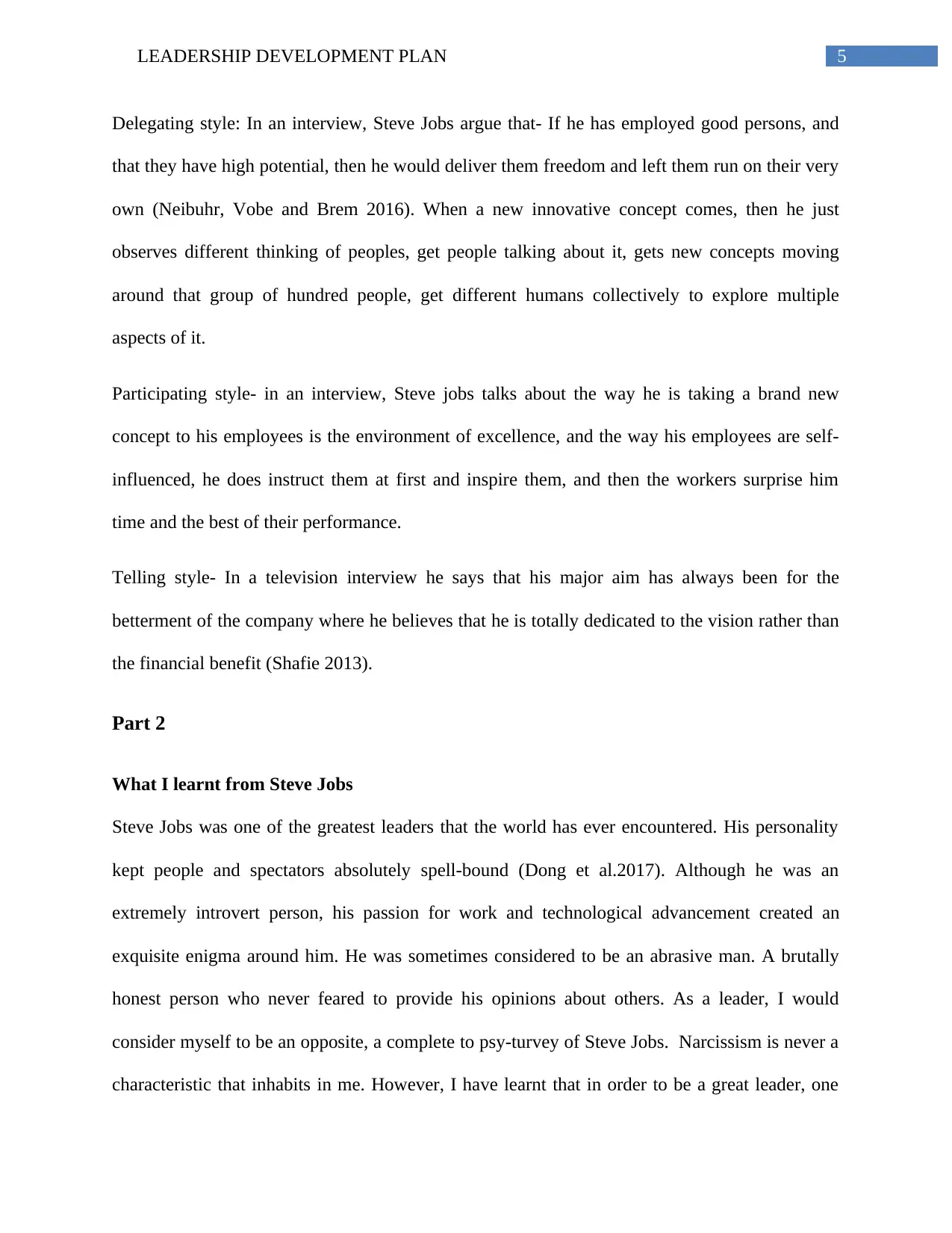
5LEADERSHIP DEVELOPMENT PLAN
Delegating style: In an interview, Steve Jobs argue that- If he has employed good persons, and
that they have high potential, then he would deliver them freedom and left them run on their very
own (Neibuhr, Vobe and Brem 2016). When a new innovative concept comes, then he just
observes different thinking of peoples, get people talking about it, gets new concepts moving
around that group of hundred people, get different humans collectively to explore multiple
aspects of it.
Participating style- in an interview, Steve jobs talks about the way he is taking a brand new
concept to his employees is the environment of excellence, and the way his employees are self-
influenced, he does instruct them at first and inspire them, and then the workers surprise him
time and the best of their performance.
Telling style- In a television interview he says that his major aim has always been for the
betterment of the company where he believes that he is totally dedicated to the vision rather than
the financial benefit (Shafie 2013).
Part 2
What I learnt from Steve Jobs
Steve Jobs was one of the greatest leaders that the world has ever encountered. His personality
kept people and spectators absolutely spell-bound (Dong et al.2017). Although he was an
extremely introvert person, his passion for work and technological advancement created an
exquisite enigma around him. He was sometimes considered to be an abrasive man. A brutally
honest person who never feared to provide his opinions about others. As a leader, I would
consider myself to be an opposite, a complete to psy-turvey of Steve Jobs. Narcissism is never a
characteristic that inhabits in me. However, I have learnt that in order to be a great leader, one
Delegating style: In an interview, Steve Jobs argue that- If he has employed good persons, and
that they have high potential, then he would deliver them freedom and left them run on their very
own (Neibuhr, Vobe and Brem 2016). When a new innovative concept comes, then he just
observes different thinking of peoples, get people talking about it, gets new concepts moving
around that group of hundred people, get different humans collectively to explore multiple
aspects of it.
Participating style- in an interview, Steve jobs talks about the way he is taking a brand new
concept to his employees is the environment of excellence, and the way his employees are self-
influenced, he does instruct them at first and inspire them, and then the workers surprise him
time and the best of their performance.
Telling style- In a television interview he says that his major aim has always been for the
betterment of the company where he believes that he is totally dedicated to the vision rather than
the financial benefit (Shafie 2013).
Part 2
What I learnt from Steve Jobs
Steve Jobs was one of the greatest leaders that the world has ever encountered. His personality
kept people and spectators absolutely spell-bound (Dong et al.2017). Although he was an
extremely introvert person, his passion for work and technological advancement created an
exquisite enigma around him. He was sometimes considered to be an abrasive man. A brutally
honest person who never feared to provide his opinions about others. As a leader, I would
consider myself to be an opposite, a complete to psy-turvey of Steve Jobs. Narcissism is never a
characteristic that inhabits in me. However, I have learnt that in order to be a great leader, one
⊘ This is a preview!⊘
Do you want full access?
Subscribe today to unlock all pages.

Trusted by 1+ million students worldwide
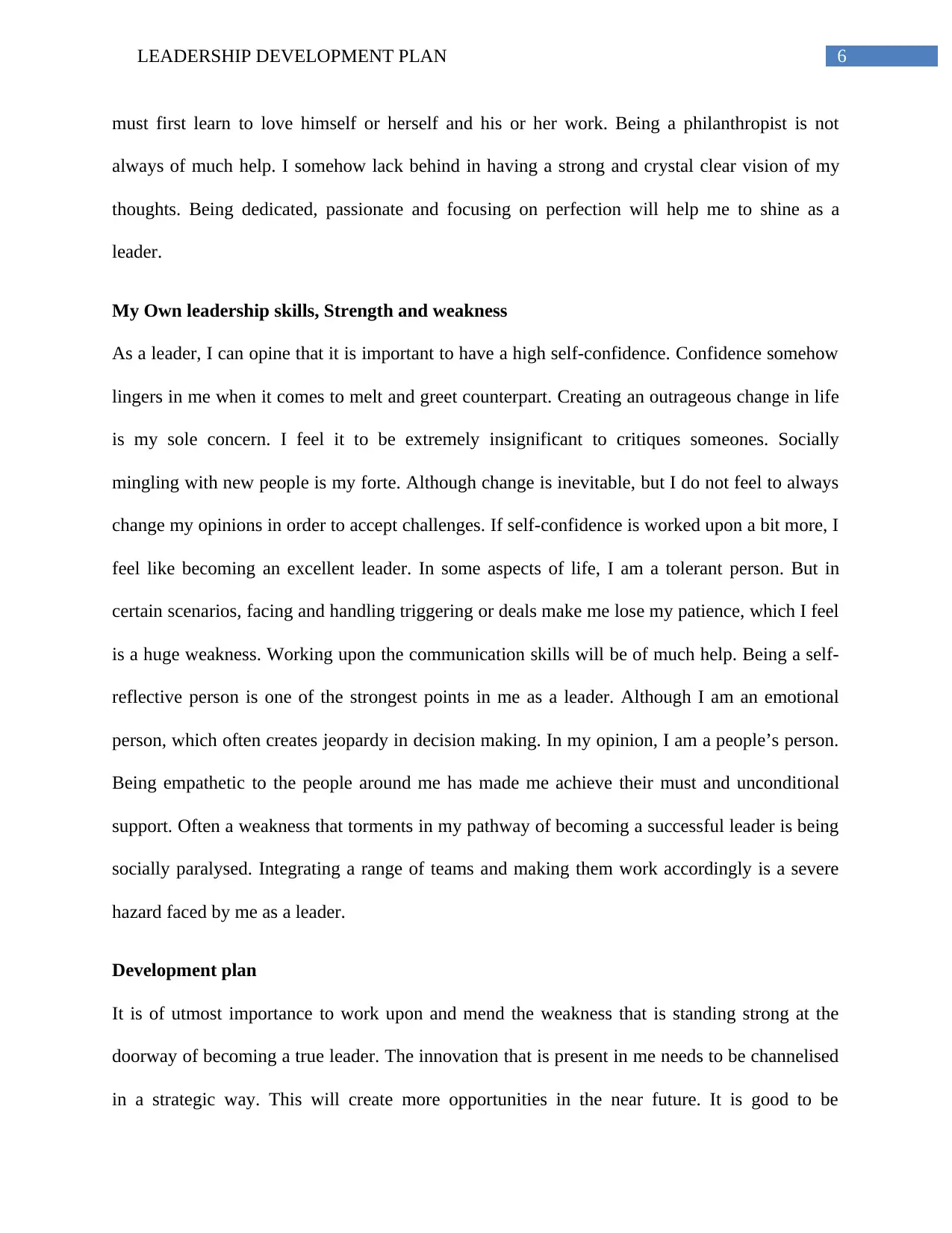
6LEADERSHIP DEVELOPMENT PLAN
must first learn to love himself or herself and his or her work. Being a philanthropist is not
always of much help. I somehow lack behind in having a strong and crystal clear vision of my
thoughts. Being dedicated, passionate and focusing on perfection will help me to shine as a
leader.
My Own leadership skills, Strength and weakness
As a leader, I can opine that it is important to have a high self-confidence. Confidence somehow
lingers in me when it comes to melt and greet counterpart. Creating an outrageous change in life
is my sole concern. I feel it to be extremely insignificant to critiques someones. Socially
mingling with new people is my forte. Although change is inevitable, but I do not feel to always
change my opinions in order to accept challenges. If self-confidence is worked upon a bit more, I
feel like becoming an excellent leader. In some aspects of life, I am a tolerant person. But in
certain scenarios, facing and handling triggering or deals make me lose my patience, which I feel
is a huge weakness. Working upon the communication skills will be of much help. Being a self-
reflective person is one of the strongest points in me as a leader. Although I am an emotional
person, which often creates jeopardy in decision making. In my opinion, I am a people’s person.
Being empathetic to the people around me has made me achieve their must and unconditional
support. Often a weakness that torments in my pathway of becoming a successful leader is being
socially paralysed. Integrating a range of teams and making them work accordingly is a severe
hazard faced by me as a leader.
Development plan
It is of utmost importance to work upon and mend the weakness that is standing strong at the
doorway of becoming a true leader. The innovation that is present in me needs to be channelised
in a strategic way. This will create more opportunities in the near future. It is good to be
must first learn to love himself or herself and his or her work. Being a philanthropist is not
always of much help. I somehow lack behind in having a strong and crystal clear vision of my
thoughts. Being dedicated, passionate and focusing on perfection will help me to shine as a
leader.
My Own leadership skills, Strength and weakness
As a leader, I can opine that it is important to have a high self-confidence. Confidence somehow
lingers in me when it comes to melt and greet counterpart. Creating an outrageous change in life
is my sole concern. I feel it to be extremely insignificant to critiques someones. Socially
mingling with new people is my forte. Although change is inevitable, but I do not feel to always
change my opinions in order to accept challenges. If self-confidence is worked upon a bit more, I
feel like becoming an excellent leader. In some aspects of life, I am a tolerant person. But in
certain scenarios, facing and handling triggering or deals make me lose my patience, which I feel
is a huge weakness. Working upon the communication skills will be of much help. Being a self-
reflective person is one of the strongest points in me as a leader. Although I am an emotional
person, which often creates jeopardy in decision making. In my opinion, I am a people’s person.
Being empathetic to the people around me has made me achieve their must and unconditional
support. Often a weakness that torments in my pathway of becoming a successful leader is being
socially paralysed. Integrating a range of teams and making them work accordingly is a severe
hazard faced by me as a leader.
Development plan
It is of utmost importance to work upon and mend the weakness that is standing strong at the
doorway of becoming a true leader. The innovation that is present in me needs to be channelised
in a strategic way. This will create more opportunities in the near future. It is good to be
Paraphrase This Document
Need a fresh take? Get an instant paraphrase of this document with our AI Paraphraser
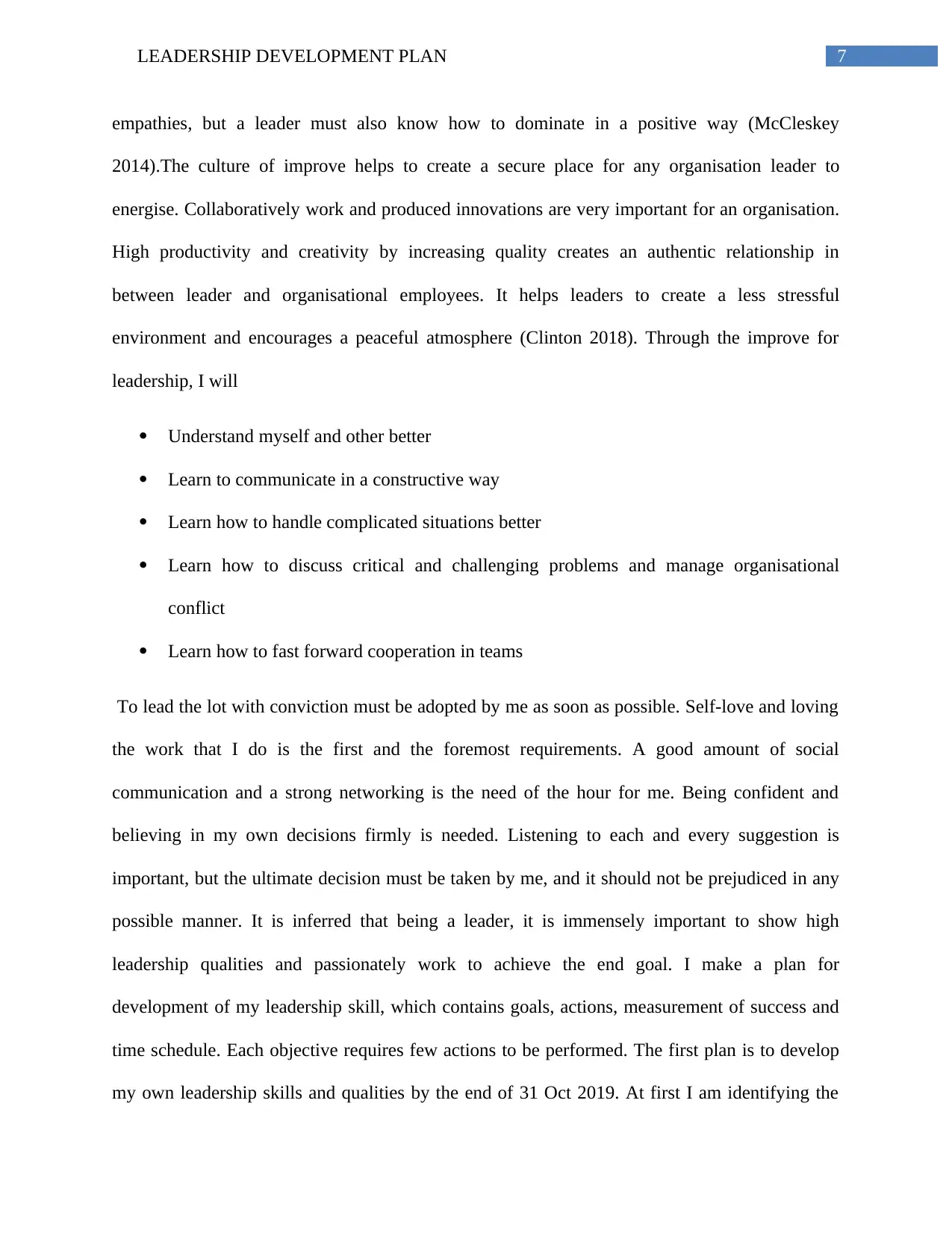
7LEADERSHIP DEVELOPMENT PLAN
empathies, but a leader must also know how to dominate in a positive way (McCleskey
2014).The culture of improve helps to create a secure place for any organisation leader to
energise. Collaboratively work and produced innovations are very important for an organisation.
High productivity and creativity by increasing quality creates an authentic relationship in
between leader and organisational employees. It helps leaders to create a less stressful
environment and encourages a peaceful atmosphere (Clinton 2018). Through the improve for
leadership, I will
Understand myself and other better
Learn to communicate in a constructive way
Learn how to handle complicated situations better
Learn how to discuss critical and challenging problems and manage organisational
conflict
Learn how to fast forward cooperation in teams
To lead the lot with conviction must be adopted by me as soon as possible. Self-love and loving
the work that I do is the first and the foremost requirements. A good amount of social
communication and a strong networking is the need of the hour for me. Being confident and
believing in my own decisions firmly is needed. Listening to each and every suggestion is
important, but the ultimate decision must be taken by me, and it should not be prejudiced in any
possible manner. It is inferred that being a leader, it is immensely important to show high
leadership qualities and passionately work to achieve the end goal. I make a plan for
development of my leadership skill, which contains goals, actions, measurement of success and
time schedule. Each objective requires few actions to be performed. The first plan is to develop
my own leadership skills and qualities by the end of 31 Oct 2019. At first I am identifying the
empathies, but a leader must also know how to dominate in a positive way (McCleskey
2014).The culture of improve helps to create a secure place for any organisation leader to
energise. Collaboratively work and produced innovations are very important for an organisation.
High productivity and creativity by increasing quality creates an authentic relationship in
between leader and organisational employees. It helps leaders to create a less stressful
environment and encourages a peaceful atmosphere (Clinton 2018). Through the improve for
leadership, I will
Understand myself and other better
Learn to communicate in a constructive way
Learn how to handle complicated situations better
Learn how to discuss critical and challenging problems and manage organisational
conflict
Learn how to fast forward cooperation in teams
To lead the lot with conviction must be adopted by me as soon as possible. Self-love and loving
the work that I do is the first and the foremost requirements. A good amount of social
communication and a strong networking is the need of the hour for me. Being confident and
believing in my own decisions firmly is needed. Listening to each and every suggestion is
important, but the ultimate decision must be taken by me, and it should not be prejudiced in any
possible manner. It is inferred that being a leader, it is immensely important to show high
leadership qualities and passionately work to achieve the end goal. I make a plan for
development of my leadership skill, which contains goals, actions, measurement of success and
time schedule. Each objective requires few actions to be performed. The first plan is to develop
my own leadership skills and qualities by the end of 31 Oct 2019. At first I am identifying the
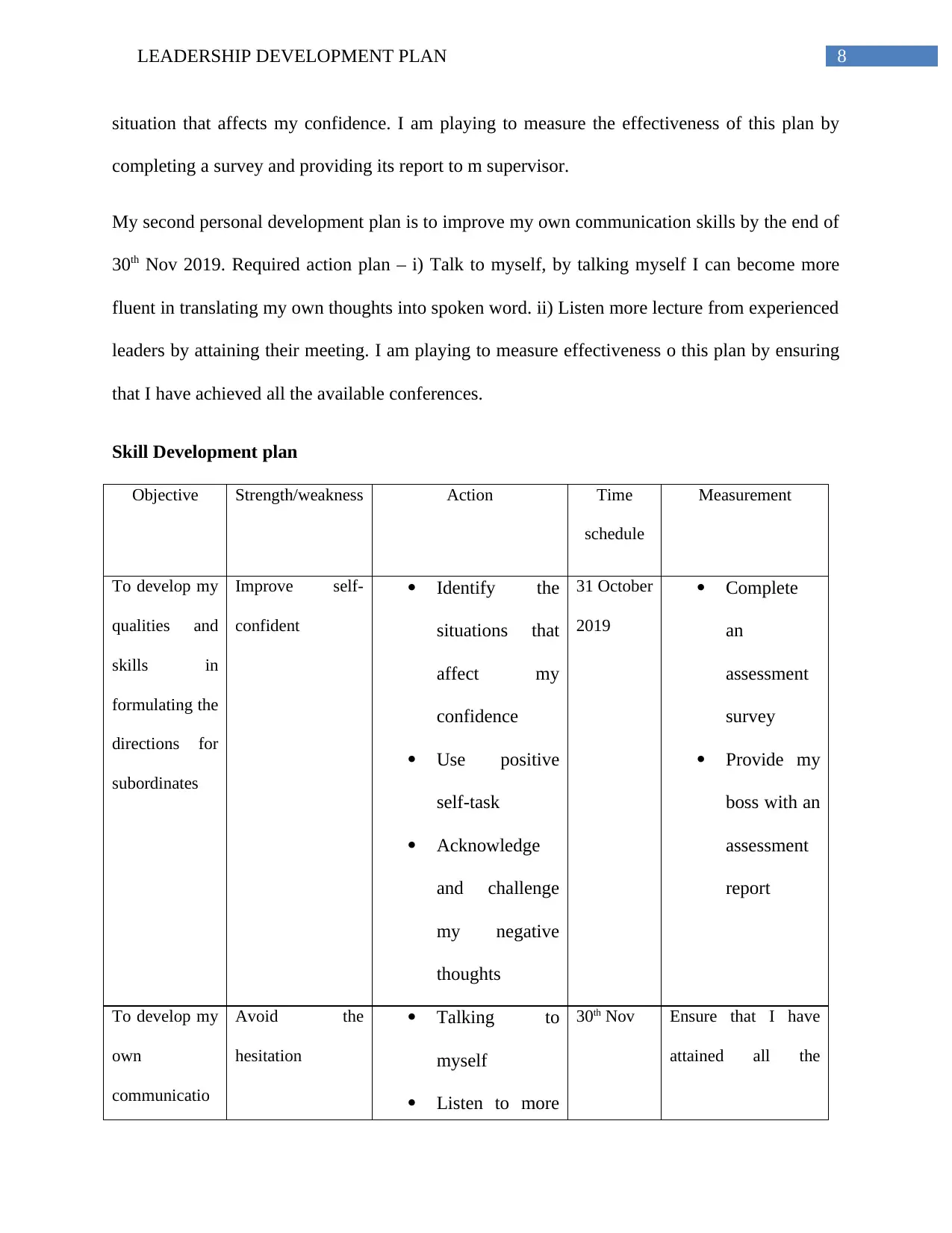
8LEADERSHIP DEVELOPMENT PLAN
situation that affects my confidence. I am playing to measure the effectiveness of this plan by
completing a survey and providing its report to m supervisor.
My second personal development plan is to improve my own communication skills by the end of
30th Nov 2019. Required action plan – i) Talk to myself, by talking myself I can become more
fluent in translating my own thoughts into spoken word. ii) Listen more lecture from experienced
leaders by attaining their meeting. I am playing to measure effectiveness o this plan by ensuring
that I have achieved all the available conferences.
Skill Development plan
Objective Strength/weakness Action Time
schedule
Measurement
To develop my
qualities and
skills in
formulating the
directions for
subordinates
Improve self-
confident
Identify the
situations that
affect my
confidence
Use positive
self-task
Acknowledge
and challenge
my negative
thoughts
31 October
2019
Complete
an
assessment
survey
Provide my
boss with an
assessment
report
To develop my
own
communicatio
Avoid the
hesitation
Talking to
myself
Listen to more
30th Nov Ensure that I have
attained all the
situation that affects my confidence. I am playing to measure the effectiveness of this plan by
completing a survey and providing its report to m supervisor.
My second personal development plan is to improve my own communication skills by the end of
30th Nov 2019. Required action plan – i) Talk to myself, by talking myself I can become more
fluent in translating my own thoughts into spoken word. ii) Listen more lecture from experienced
leaders by attaining their meeting. I am playing to measure effectiveness o this plan by ensuring
that I have achieved all the available conferences.
Skill Development plan
Objective Strength/weakness Action Time
schedule
Measurement
To develop my
qualities and
skills in
formulating the
directions for
subordinates
Improve self-
confident
Identify the
situations that
affect my
confidence
Use positive
self-task
Acknowledge
and challenge
my negative
thoughts
31 October
2019
Complete
an
assessment
survey
Provide my
boss with an
assessment
report
To develop my
own
communicatio
Avoid the
hesitation
Talking to
myself
Listen to more
30th Nov Ensure that I have
attained all the
⊘ This is a preview!⊘
Do you want full access?
Subscribe today to unlock all pages.

Trusted by 1+ million students worldwide
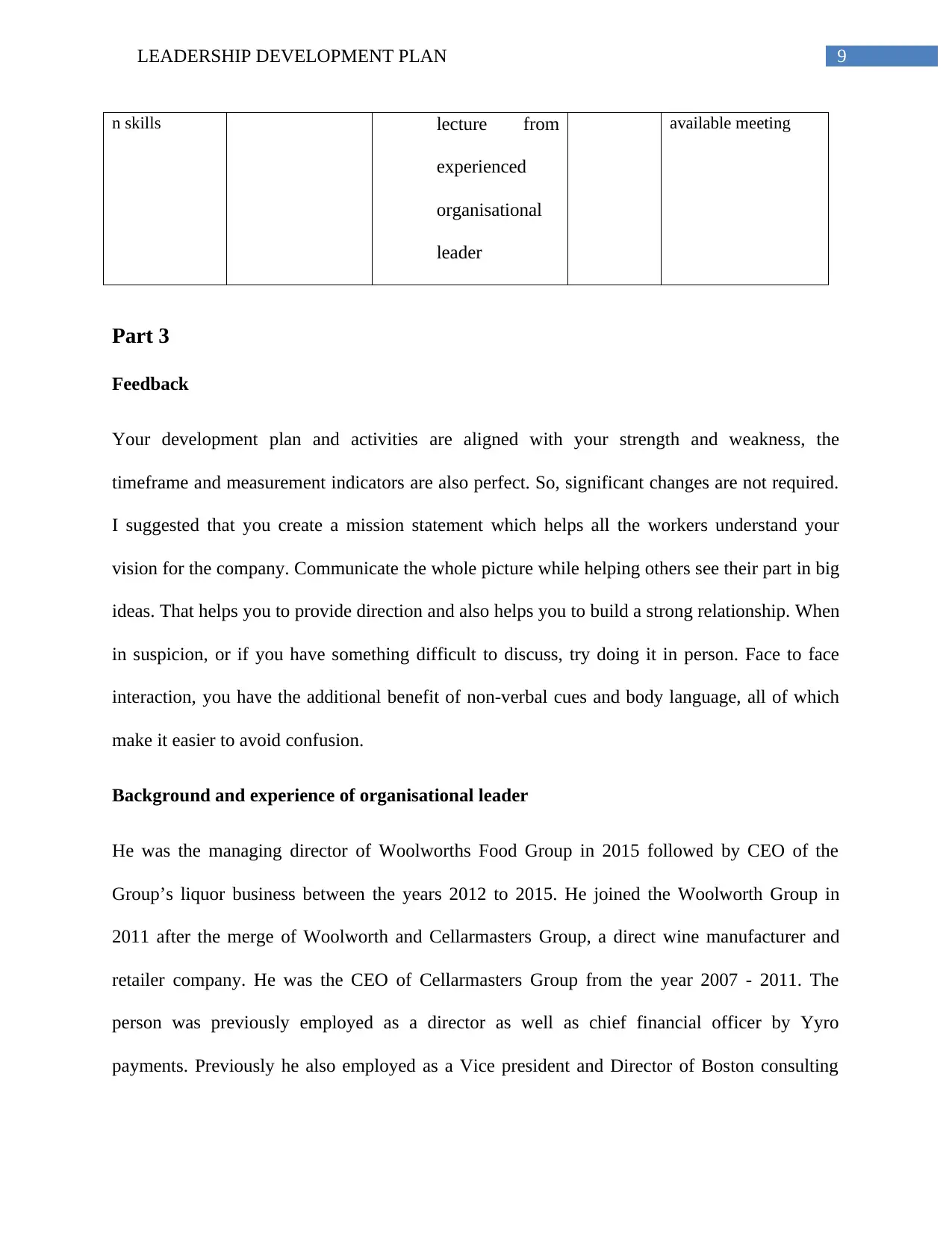
9LEADERSHIP DEVELOPMENT PLAN
n skills lecture from
experienced
organisational
leader
available meeting
Part 3
Feedback
Your development plan and activities are aligned with your strength and weakness, the
timeframe and measurement indicators are also perfect. So, significant changes are not required.
I suggested that you create a mission statement which helps all the workers understand your
vision for the company. Communicate the whole picture while helping others see their part in big
ideas. That helps you to provide direction and also helps you to build a strong relationship. When
in suspicion, or if you have something difficult to discuss, try doing it in person. Face to face
interaction, you have the additional benefit of non-verbal cues and body language, all of which
make it easier to avoid confusion.
Background and experience of organisational leader
He was the managing director of Woolworths Food Group in 2015 followed by CEO of the
Group’s liquor business between the years 2012 to 2015. He joined the Woolworth Group in
2011 after the merge of Woolworth and Cellarmasters Group, a direct wine manufacturer and
retailer company. He was the CEO of Cellarmasters Group from the year 2007 - 2011. The
person was previously employed as a director as well as chief financial officer by Yyro
payments. Previously he also employed as a Vice president and Director of Boston consulting
n skills lecture from
experienced
organisational
leader
available meeting
Part 3
Feedback
Your development plan and activities are aligned with your strength and weakness, the
timeframe and measurement indicators are also perfect. So, significant changes are not required.
I suggested that you create a mission statement which helps all the workers understand your
vision for the company. Communicate the whole picture while helping others see their part in big
ideas. That helps you to provide direction and also helps you to build a strong relationship. When
in suspicion, or if you have something difficult to discuss, try doing it in person. Face to face
interaction, you have the additional benefit of non-verbal cues and body language, all of which
make it easier to avoid confusion.
Background and experience of organisational leader
He was the managing director of Woolworths Food Group in 2015 followed by CEO of the
Group’s liquor business between the years 2012 to 2015. He joined the Woolworth Group in
2011 after the merge of Woolworth and Cellarmasters Group, a direct wine manufacturer and
retailer company. He was the CEO of Cellarmasters Group from the year 2007 - 2011. The
person was previously employed as a director as well as chief financial officer by Yyro
payments. Previously he also employed as a Vice president and Director of Boston consulting
Paraphrase This Document
Need a fresh take? Get an instant paraphrase of this document with our AI Paraphraser
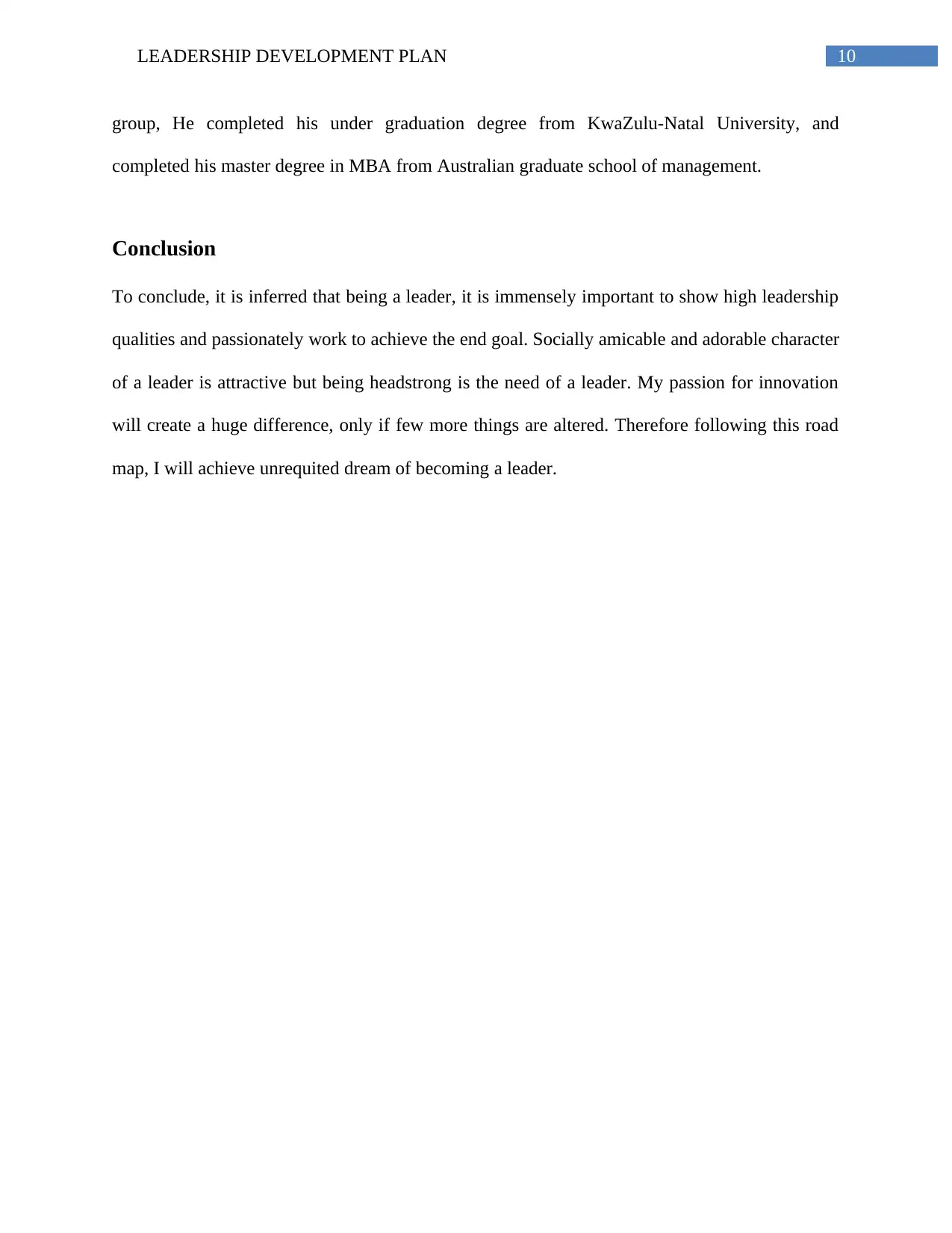
10LEADERSHIP DEVELOPMENT PLAN
group, He completed his under graduation degree from KwaZulu-Natal University, and
completed his master degree in MBA from Australian graduate school of management.
Conclusion
To conclude, it is inferred that being a leader, it is immensely important to show high leadership
qualities and passionately work to achieve the end goal. Socially amicable and adorable character
of a leader is attractive but being headstrong is the need of a leader. My passion for innovation
will create a huge difference, only if few more things are altered. Therefore following this road
map, I will achieve unrequited dream of becoming a leader.
group, He completed his under graduation degree from KwaZulu-Natal University, and
completed his master degree in MBA from Australian graduate school of management.
Conclusion
To conclude, it is inferred that being a leader, it is immensely important to show high leadership
qualities and passionately work to achieve the end goal. Socially amicable and adorable character
of a leader is attractive but being headstrong is the need of a leader. My passion for innovation
will create a huge difference, only if few more things are altered. Therefore following this road
map, I will achieve unrequited dream of becoming a leader.
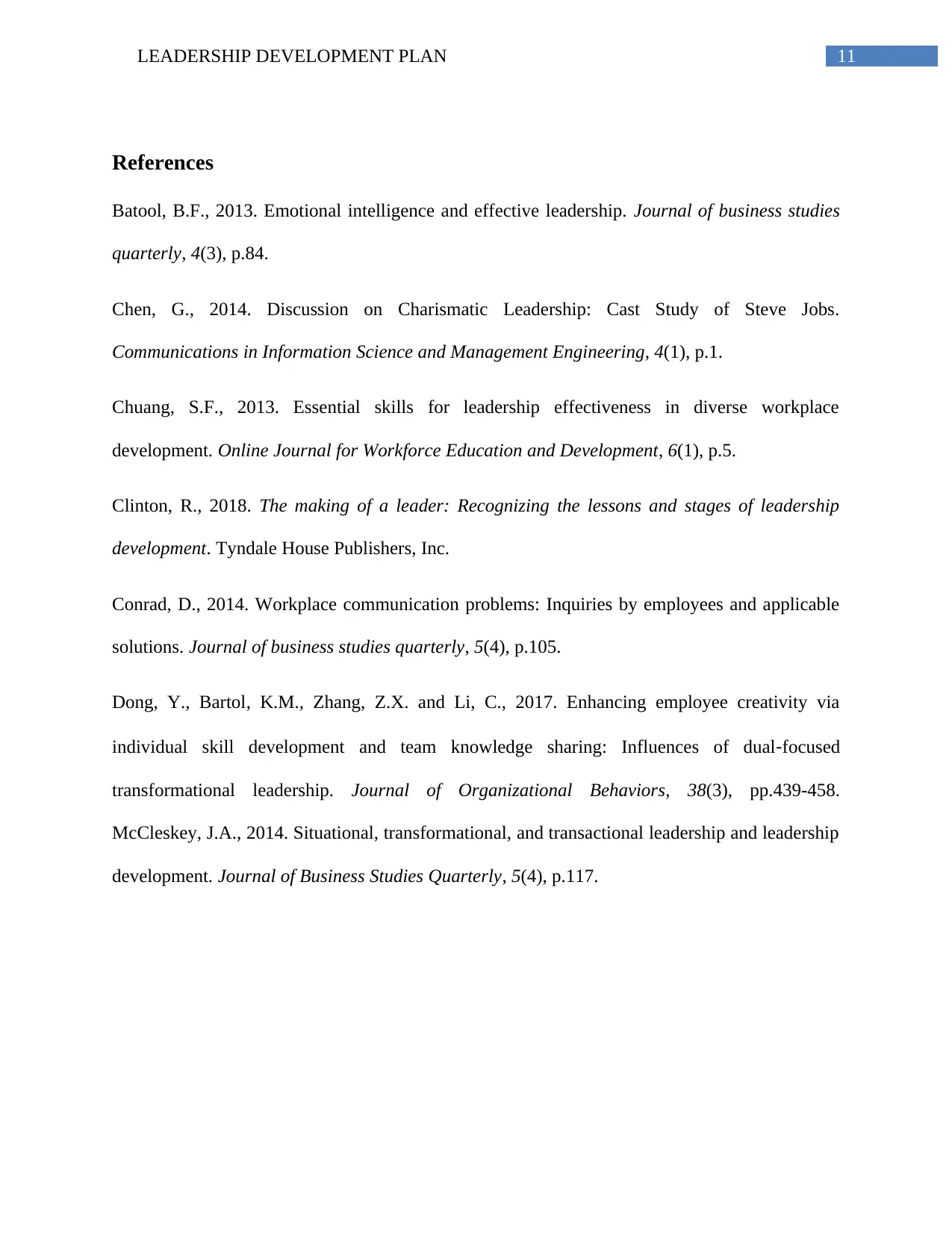
11LEADERSHIP DEVELOPMENT PLAN
References
Batool, B.F., 2013. Emotional intelligence and effective leadership. Journal of business studies
quarterly, 4(3), p.84.
Chen, G., 2014. Discussion on Charismatic Leadership: Cast Study of Steve Jobs.
Communications in Information Science and Management Engineering, 4(1), p.1.
Chuang, S.F., 2013. Essential skills for leadership effectiveness in diverse workplace
development. Online Journal for Workforce Education and Development, 6(1), p.5.
Clinton, R., 2018. The making of a leader: Recognizing the lessons and stages of leadership
development. Tyndale House Publishers, Inc.
Conrad, D., 2014. Workplace communication problems: Inquiries by employees and applicable
solutions. Journal of business studies quarterly, 5(4), p.105.
Dong, Y., Bartol, K.M., Zhang, Z.X. and Li, C., 2017. Enhancing employee creativity via
individual skill development and team knowledge sharing: Influences of dual‐focused
transformational leadership. Journal of Organizational Behaviors, 38(3), pp.439-458.
McCleskey, J.A., 2014. Situational, transformational, and transactional leadership and leadership
development. Journal of Business Studies Quarterly, 5(4), p.117.
References
Batool, B.F., 2013. Emotional intelligence and effective leadership. Journal of business studies
quarterly, 4(3), p.84.
Chen, G., 2014. Discussion on Charismatic Leadership: Cast Study of Steve Jobs.
Communications in Information Science and Management Engineering, 4(1), p.1.
Chuang, S.F., 2013. Essential skills for leadership effectiveness in diverse workplace
development. Online Journal for Workforce Education and Development, 6(1), p.5.
Clinton, R., 2018. The making of a leader: Recognizing the lessons and stages of leadership
development. Tyndale House Publishers, Inc.
Conrad, D., 2014. Workplace communication problems: Inquiries by employees and applicable
solutions. Journal of business studies quarterly, 5(4), p.105.
Dong, Y., Bartol, K.M., Zhang, Z.X. and Li, C., 2017. Enhancing employee creativity via
individual skill development and team knowledge sharing: Influences of dual‐focused
transformational leadership. Journal of Organizational Behaviors, 38(3), pp.439-458.
McCleskey, J.A., 2014. Situational, transformational, and transactional leadership and leadership
development. Journal of Business Studies Quarterly, 5(4), p.117.
⊘ This is a preview!⊘
Do you want full access?
Subscribe today to unlock all pages.

Trusted by 1+ million students worldwide
1 out of 21
Related Documents
Your All-in-One AI-Powered Toolkit for Academic Success.
+13062052269
info@desklib.com
Available 24*7 on WhatsApp / Email
![[object Object]](/_next/static/media/star-bottom.7253800d.svg)
Unlock your academic potential
Copyright © 2020–2026 A2Z Services. All Rights Reserved. Developed and managed by ZUCOL.





